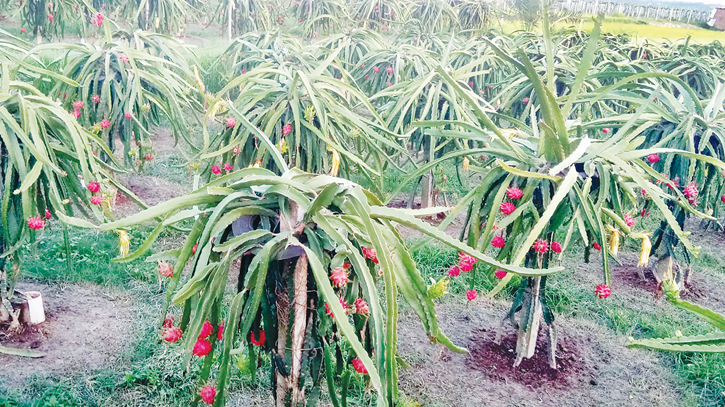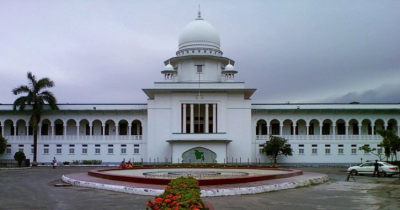
A glimpse of the dragon fruit orchard in Chaugachha, Jashore. Photo: Messenger
The expansive cultivation of dragon fruit in Chaugachha, Jashore, is causing concern as it encroaches upon land traditionally used for vegetable farming, leading to a noticeable reduction in vegetable production.
Data from the upazila agriculture office reveals that Chaugachha, famous for vegetable production, boasts 22,500 hectares of arable land, with 3,900 hectares previously dedicated to various vegetables. However, over the past three to four years, approximately 250 hectares of this land have been repurposed for dragon fruit cultivation, directly impacting vegetable output.
The surge in dragon fruit cultivation initially began as a hobby among locals about five years ago. Starting in household yards or fallow lands, it gradually expanded into planned cultivation within croplands. Presently, dragon fruit is cultivated across 260 hectares in the upazila, with each plant bearing fruit for a decade or more, effectively annexing cropland and diminishing the production of other essential crops, subsequently affecting the market.
As winter descends, Chaugachha, renowned as the vegetable production capital, witnesses soaring vegetable prices, with prices not dropping below Tk 50 per kilogram. This spike is attributed to the decline in vegetable production, exacerbating the situation.
Investigations reveal that unemployed youths, entrepreneurs, and expatriates are increasingly drawn to dragon farming, with some individuals cultivating dragon fruit across expansive plots ranging from 2 to 10/15 bigha.
Previously, these lands harbored various vegetables like brinjal, green chillies, Uchche, potl, radish, beans, and tomatoes, but are now dominated by dragon fruit orchards.
Dragon fruit growers, including Salim Hossain, Ruhul Amin, Hossain Ali, and Raju Ahmed, acknowledge the profitability of dragon farming in the long term. However, they concede that it comes at the expense of reduced cropland and vegetable production. Many stakeholders advocate for a reduction in dragon fruit cultivation to alleviate the strain on vegetable farming.
Local vegetable vendors such as Kabir Hossain, Samshul Alam, and Ainal Hossain report a significant decline in vegetable imports over the years, attributing it to diminishing vegetable cultivation replaced by dragon fruit orchards. Consumers like Monirul Islam and Salim Reza lament the escalating prices of vegetables, citing decreased production as the primary cause.
Arif Hossain, a retail vegetable seller, sheds light on the market dynamics, highlighting the challenges posed by diminished vegetable imports and subsequent price hikes. Despite efforts to maintain a steady supply, retailers find themselves at the mercy of fluctuating market conditions, struggling to reconcile procurement costs with consumer expectations.
In response to the evolving agricultural landscape, Upazila Agriculture Officer Musabbir Hossain underscores the importance of exploring alternative strategies to promote vegetable cultivation and alleviate the strain on traditional farming practices. Initiatives aimed at incentivizing vegetable production and providing support to local farmers are underway, with a focus on achieving a sustainable balance between dragon fruit cultivation and traditional agriculture.
As Chaugachha navigates the complexities of agricultural transformation, stakeholders are called upon to engage in dialogue and collaboration to safeguard the region's agricultural heritage while embracing the opportunities presented by emerging trends. By fostering innovation and resilience, Chaugachha can chart a course towards a more sustainable and inclusive agricultural future, ensuring prosperity for generations to come.
Messenger/Faria








